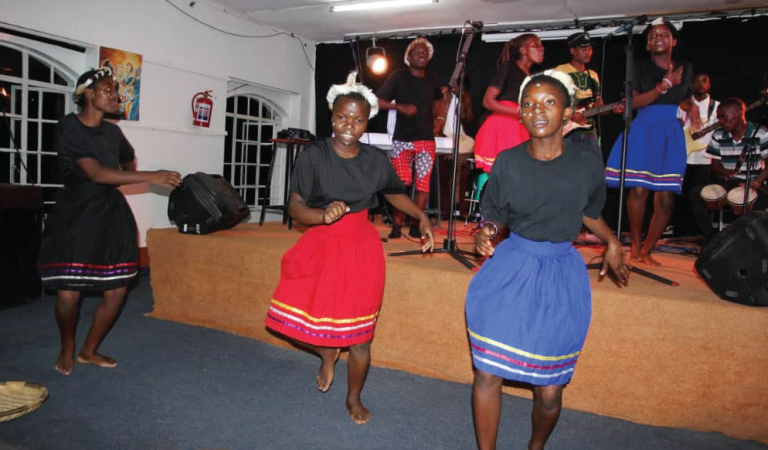It is Thursday evening and Jacaranda Cultural Centre in Blantyre main hall is full with patrons ready and eager to enjoy some performances. But this particular Thursday is special because the stage is graced by young and energetic students from Jacaranda School of Orphans. They are called Jacaranda Cutural Troupe.
As soon as the director of ceremonies Waliko Makhala announces them as the first act for the day, they come running to the stage. dressed in colourful skirts and pairs of trousers and all black T-shirts, the girls and boys are also donning the traditional Ngoni crowns, commonly known as nthini.
Though they are being backed by a modern band, their sound is heavily traditional. They fuse modern sound with traditional folksongs, including A Molotoni, Udindo Wanu, Kambalame and Zione. Throughout the performances, the girls and boys fuse the songs with traditional dances such as mganda, ingoma, and chioda. They also use winnowers in their performance.
They are such a beautiful scene. Their set is flawless and their pride in expressing themselves through the cultural songs is admirable.
Addressing the patrons midway during their performance, Jacaranda Cultural Centre director Luc Deschamps tells the patrons that the cultural troupe was designed to help preserve Malawi’s culture through art.
“We want to help preserve the culture by teaching our children about culture. When they grow, they will also teach their children and in that way the culture will be passed on from generation to generation,” he says.
Deschamps says as a centre they launched Sounds of Malawi three years ago to celebrate local art, especially that with a heavy leaning towards culture.
“In the year 2023, I am happy that we have started with the youth under the Sounds of Malawi programme. And we are happy that you came in large numbers,” he tells the patrons who filled the hall.
After the Jacaranda Cultural Troupe finishes its set, the stage was taken over by Waliko Makhala and his band. They too keep it local with music which he calls Bush Music.
At the end of their set, they play a song Anachita Chobaya, originally done by the late Stonald Lungu.
“We first recorded this song in Ndirande with Rick Deja in 1991. We play it again on this stage today, 22 years later to celebrate the strength of art. This song remains relevant today,” he says.
Finally, it was time for Agorosso to wind up performances for the night. A regular at Sounds of Malawi stage, Agorosso decided to do something he does not normally do. He dances the Shire Valley utche traditional dance and the Jacaranda Culture Troupe members joins him ending what will be remembered as the probably one of the most electrifying Sounds of Malawi events.
In post-event random interviews, patrons expressed hope that the pace set for the New Year will be maintained.
Said Grace Khamu: “I hope they will keep such powerful and well-executed performances. All artists that graced the stage today clearly understood the assignment. One could see that they rehearsed and their stage chemistry was off the charts.”
The event was also supposed to have a performance by female musician Keturah, but cancelled on the last minute due to unforeseen circumstances.
The post Preserving culture via art appeared first on The Nation Online.
 Moni Malawi
Moni Malawi 

